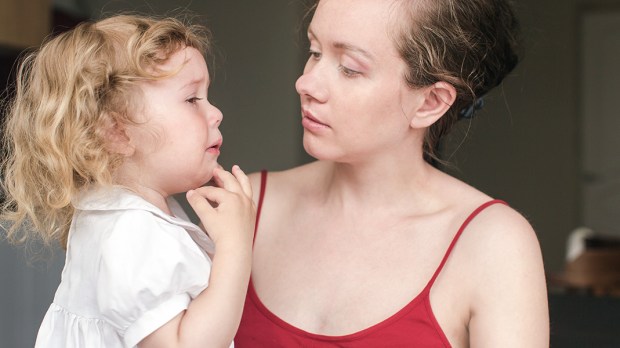For years, our family motto when it came to injuries was “no blood, no problem!”
This was meant to teach our kids that minor scrapes and bumps were part of life and to help them develop the perspective and resilience necessary to get through them. But it ended up giving our children a disproportionate understanding of the role of blood in any given injury, such that our 5- and 8-year-olds respond to a scraped knee that bleeds with howls of lamentation, but our 11-year-old tried to “walk off” a broken ankle for two days until she finally admitted how badly it hurt.
It wasn’t until the broken ankle incident that I realized I needed to treat each injury individually, responding appropriately myself while also teaching my kids how to respond appropriately. I thought I had been too dismissive of their pain, but what I was actually doing was worse. This article at Scary Mommy made me realize that I was gaslighting my kids, and had been for years.
We gaslight them because we fear that if we don’t, they’ll grow up unable to deal with the crappy misfortunes life throws at them, and their lack of coping mechanisms will be all our fault.
But just because we’ve heard it over and over doesn’t make it right, and when we dismiss their emotions, we’re actually invalidating them. Instead of empathy and understanding, we’re telling them that their experience, their natural feelings about a situation, are wrong. Our children look to us, the most influential authority figures in their lives, to teach them how the world works, and then we use that power to tell them they don’t know anything. Maybe we don’t agree that it’s something they should be upset about, but here’s the thing: It isn’t up to us. Their feelings aren’t ours to dictate.
Gaslighting, in case you’re unfamiliar with the term, is when “one person tries to persuade another that their feelings and experiences are inaccurate or misguided.” The term comes from a 1938 play called Gas Light, in which a husband tries to convince his wife (and others) that she is insane by manipulating elements of their home — notably, by dimming the gas lights — and claiming she’s delusional or mistaken when she points it out.
Should we draw a distinction between intentional, malicious gaslighting and unintentional gaslighting, though? It’s surprisingly easy to manipulate someone in this manner, particularly an intimate partner or child. It’s actually a red flag that counselors look for in cases of emotional abuse. But that kind of manipulation is obviously distinct from the tough-love “shake it off” strategy widely used by parents … right?
Yes and no. Our intent might make a difference to us, but it doesn’t change our child’s experience. Case in point, my 11-year-old: She didn’t want to “complain” or “be a baby” about her broken ankle, because over the years she internalized the message that admitting pain is a sign of weakness and/or causes us, her parents, irritation.
This is obviously not what we were going for, but it’s what we accomplished. That’s the difference between intentional gaslighting and unintentional gaslighting — one is damaging someone on purpose, and another is damaging someone by accident. This difference is really only important for the one doing it, though. The person being gaslighted is damaged either way.
However, our intent does matter insofar as we are able to step back, acknowledge to ourselves and our children that we were wrong and have hurt them, and change. It’s never an easy thing for a parent to do, but it’s vital if we’re going to raise kids who are truly resilient.
After all, resilience isn’t ignoring or denying emotional or physical pain. It’s acknowledging that pain and doing whatever is necessary to work though it, heal as much as possible, and keep going. The first step to teaching our kids resilience isn’t denial, it’s acceptance … of them and of ourselves.

Read more:
Are you emotionally dependent? Here’s what you need to know

